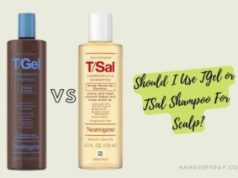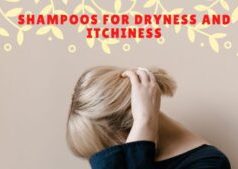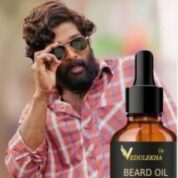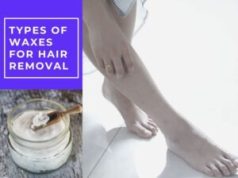Among the hair oils most frequently used by people with natural hair are castor and argan oils. Many will agree that they offer some incredible benefits for hair.
Selecting the appropriate oil is one of the biggest challenges people face when incorporating oils into their hair regimen. This post is for you if you’re not sure whether castor or argan oil is better for your hair.
We’ll discuss castor oil vs. argan oil for hair in it and highlight all the differences you should be aware of. Now let’s get started!
What Is Castor Oil?
Castor oil is a vegetable oil derived from the castor bean (Ricinus communis). It’s a thick and colorless oil with a distinct, somewhat unpleasant odor. Castor oil has been used for various purposes, including as a laxative, in the manufacturing of soaps, lubricants, and as an ingredient in cosmetics and skin care products. It’s also known for its potential medicinal and therapeutic properties, often used topically for conditions like dry skin, hair growth, and as a natural remedy for certain ailments. However, its use should be done with caution and under proper guidance due to its powerful laxative effect when taken orally.
It is believed that the oil first appeared in East Africa around 4000 B.C. And nowadays, it’s used for many purposes, one of which is to encourage hair health.
Compared to other oils you may have worked with in the past, pure castor oil is an extremely thick, sticky, and heavy oil. It is transparent and has a yellowish colour.
Because the castor beans are roasted before the oil is extracted, one type of castor oil, called Jamaican Black Castor Oil, has a darker colour.
Also Read: Can You Feel Your Hair Grow On Your Head? Face or Body?
What Is Argan Oil?
Argan oil, also known as Moroccan oil, is a plant oil derived from the kernels of the argan tree (Argania spinosa), which is native to Morocco. It’s a highly sought-after cosmetic and culinary oil known for its numerous benefits.
In the cosmetic industry, argan oil is used in skincare and hair care products due to its moisturizing, antioxidant, and nourishing properties. It’s often used to hydrate and condition the skin and hair, helping to improve their appearance and texture.
Culinary argan oil, on the other hand, is used in cooking and is valued for its nutty flavor and nutritional qualities. It’s commonly used in Moroccan cuisine for dishes like tagines and couscous.
Argan oil is rich in essential fatty acids, antioxidants, and vitamins, making it popular for its potential benefits in both the beauty and culinary worlds.
The oil is now regularly used on hair to boost its look, feel, and overall condition.
Castor Oil vs. Argan Oil for Hair: How They’re Different
Castor oil and argan oil are two popular choices for hair care, but they have different properties and uses:
Source:
- Castor Oil: Derived from the castor bean, it’s a thick and viscous oil.
- Argan Oil: Comes from the kernels of the argan tree and is lighter in consistency.
- Nutritional Content:
Castor Oil: Rich in ricinoleic acid, which is known for its potential hair growth and conditioning properties.
Argan Oil: Contains essential fatty acids and antioxidants, which help with hair moisture and shine.
- Hair Growth:
- Castor Oil: Often used for promoting hair growth and thickness due to its ricinoleic acid content.
- Argan Oil: While it can improve hair’s overall health, it’s not as well-known for promoting hair growth.
- Moisturization:
- Castor Oil: Heavier and more viscous, making it excellent for deep conditioning and moisturizing dry, frizzy hair.
- Argan Oil: Lighter and absorbed easily, making it great for providing shine and taming frizz.
- Scalp Health:
- Castor Oil: Its antibacterial and anti-inflammatory properties may benefit the scalp.
- Argan Oil: Can help maintain a healthy scalp by providing necessary nutrients.
- Usage:
- Castor Oil: Typically used as a deep treatment or hair mask.
- Argan Oil: Often used as a leave-in conditioner or a few drops for shine and frizz control.
Hair penetration
It’s critical to understand the reaction of the oil on your hair when utilising it in your routine. Sealing oils are protective substances that sit on top of hair and keep moisture in while preventing it from escaping.
The Ability to Penetrate Argan Oil
An oil that can both penetrate and seal, argan oil is a hybrid. This oil will penetrate the shaft of your hair when you apply it, but part of it will remain on the outside of your strands and create a barrier to keep the beneficial elements inside.
Weight
It’s wise to weigh an oil before incorporating it into your hair care routine. How come? Because an oil that is too thick for your hair may weigh it down and cause it to become limp and flat.
However, very mild oils might not be thick enough to change your hair in a noticeable way over time.
The Weight of Argan Oil
It’s well known that argan oil is a lightweight oil that works well with almost every type of hair. With normal to coarse hair, you won’t have to worry too much about greasy or flat hair while using it as needed.
However, if you have thin or fine hair, this might easily become a problem.
In summary, castor oil is often favored for its potential to stimulate hair growth, while argan oil is valued for its ability to moisturize and add shine. The choice between the two depends on your specific hair needs and preferences. You can also combine them for a comprehensive hair care routine.
Also Read: Why Does My Hair Grow So Fast on My Head or Other Body Parts?
Pros and Cons of Argan Oil for Hair
Pros of using Argan oil for hair:
- Deep Moisturization: Argan oil is highly effective at hydrating and nourishing hair, making it an excellent choice for dry or damaged hair.
- Shine and Smoothness: It adds a natural shine to hair and can help tame frizz, leaving your hair looking smoother and more manageable.
- Nutrient-Rich: Rich in essential fatty acids, antioxidants, and vitamins, argan oil provides nutrients that can benefit the overall health of your hair.
- UV Protection: It can help protect your hair from the damaging effects of UV radiation, making it a good option for sun-exposed hair.
- Scalp Health: Argan oil can be beneficial for maintaining a healthy scalp, as it helps with dandruff and dryness.
- Versatility: It can be used in various ways, such as a leave-in conditioner, a pre-shampoo treatment, or even as a styling product.
Cons of using Argan oil for hair:
- Cost: Pure, high-quality argan oil can be relatively expensive compared to other hair oils.
- Weight: It might be too heavy for people with very fine or thin hair, potentially causing it to appear greasy.
- Potential Allergies: Some individuals may be sensitive or allergic to argan oil, so it’s important to perform a patch test before using it extensively.
- Quantity: It’s easy to overuse, and using too much can leave your hair looking oily.
In general, argan oil is a versatile and beneficial choice for many hair types, but it’s important to use it in moderation and find the right balance to avoid potential downsides like greasiness. Additionally, it’s essential to opt for high-quality, pure argan oil to maximize its benefits.
Pros and Cons of Castor Oil for Hair
Pros of using Castor oil for hair:
- Hair Growth: Castor oil is known for its potential to stimulate hair growth and thicken hair due to its ricinoleic acid content.
- Moisturization: It’s a powerful emollient that can deeply moisturize and condition the hair, reducing dryness and frizz.
- Scalp Health: Castor oil has antibacterial and anti-inflammatory properties, which can promote a healthy scalp and help with dandruff and other scalp issues.
- Strength and Thickness: Regular use of castor oil can strengthen hair and make it appear thicker and more resilient.
- Split Ends: It can help prevent and repair split ends, enhancing the overall health and appearance of the hair.
Cons of using Castor oil for hair:
- Viscosity: Castor oil is very thick and sticky, which can make it challenging to apply and wash out. Some people find it too heavy for their hair.
- Greasy Appearance: Using too much castor oil or not washing it out properly can leave the hair looking greasy and weighed down.
- Allergies: Like any product, some individuals may be allergic to castor oil, so a patch test is advisable.
- Odor: Castor oil has a distinct, somewhat unpleasant odor that some people may find off-putting.
- Laxative Effect: When taken orally, castor oil is a powerful laxative and should not be ingested in large quantities.
In conclusion, castor oil is a popular choice for hair care, especially for those looking to promote hair growth and improve hair health. However, its thickness and stickiness may not be suitable for everyone, and it’s essential to use it in moderation to avoid a greasy appearance.
Conclusion
In summary, both castor oil and argan oil have their unique advantages and disadvantages when it comes to hair care:
Castor Oil is known for its potential to stimulate hair growth, strengthen hair, and promote scalp health. However, its thick and sticky nature can be challenging to work with, and it can leave hair looking greasy if not used in moderation.
Argan Oil is excellent for moisturizing, adding shine, and improving overall hair health. It’s lighter and more versatile, but it can be relatively expensive, and excessive use can make hair appear greasy.
The choice between these oils depends on your specific hair needs and preferences. You can also consider using a combination of both to reap the benefits of each oil for a comprehensive hair care routine.






